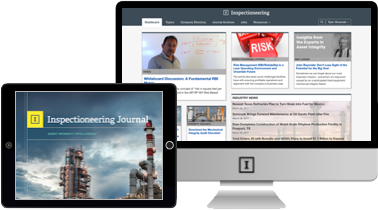| This article is part 3 of a 3-part series. |
| Part 1 | Part 2 | Part 3 |
Editor’s Note: It has often been stated that an ounce of prevention is worth a pound of cure. The following series of articles covers practices that aim to eliminate the potential for creating defects in equipment by identifying conditions leading to defect creation and eliminating them in a proactive manner. Hence, practices such as IOWs, inspection, and QC will be familiar to the Inspectioneer. This is the third part of a multi-part series. Part 1 appeared in the January/February 2019 issue of Inspectioneering Journal and Part 2 appeared in the March/April 2019 issue.
Introduction
A quest for achieving a defect-free plant operation requires the execution of a management strategy capable of altering the current mindsets of an organization. It requires implementing systems and processes that help ensure plants are designed, constructed, operated, and maintained to remain defect free.
A 5-prong business strategy was laid out in Part 1 of this series of articles and forms the basis of this management strategy. The strategy requires that the executive management team adopt new thinking, develop an enlightened and skillful workforce, implement a comprehensive management system (MS), create effective processes, and instill a culture of continuous improvement.
A new ‘Lean Way of Thinking’ is a proven component of a successful operational strategy. This thinking has benefited businesses globally by helping them realize improvements in their bottom line, product quality, process safety, equipment reliability, health and safety of personnel, and the protection of the environment.
Two important aspects of the ‘Lean Way of Thinking’ include the ‘recognition and elimination of waste’ and the implementation of the ‘zero QC’ concept. Both of these were discussed at length in Part 1 of this series. The 8 sources of waste that are endemic to the process industry include overproduction, delay, unnecessary transportation, faulty processes, inventory, defective products, unnecessary work, and unused human capability. Zero QC techniques include ‘Self Checks’ which confirm the quality of one’s own work; ‘Successive Checks’ which ensure that work performed at the previous stage met the quality requirements; ‘Source Inspections’ to discover errors, perform feedback and action at the error stage to prevent those errors from turning into defects; ‘Poka-Yoke’, also known as mistake-proofing, involves carrying out 100% inspections and if abnormalities are discovered, provide immediate feedback and perform corrective action.
A clear understanding of the ‘Lean Way of Thinking’ is fundamental to altering the current mindsets in the industry. It will steer management into taking a proactive approach, identifying and eliminating wasteful activities hidden within the plant processes, and upgrading those processes by including self-checks, successive checks, information that may lead to identifying errors, and the steps necessary to prevent those errors from maturing into defects.
Part 2 of this series described the implementation of the first three steps of the 5-prong business strategy. The implementation of a comprehensive and fully integrated MS (Step 3) was described in detail to show the importance of having a qualified management team responsible for the development of the MS. A fully integrated MS assimilates all systems and processes of an organization into one complete framework, enabling an organization to work as a single unit with unified objectives. The implementation of a fully Integrated MS is vital for achieving defect-free plant operation.
It is important to remember that a MS can vary from one organization to another. A MS is simply a vehicle that takes plant personnel from the policy level stage to the point where a quality product is safely realized. An effective MS is precise, clearly laid out, and properly linked to ensure that the flow of information from the policy level up to the point of work procedures is not interrupted.
In his first two articles, the author has tried to give readers an introduction to the 5-prong business strategy and ‘Lean Way of Thinking.’ The information is intended to prompt readers into undertaking further studies about the topics discussed. In Part 3 of this article, the author will explain: the application of the MS to plant processes and how to realize a defect-free status at each phase of an operation; what is expected in the critical processes; current industry wide gaps; continuous improvement of chemical and work processes; developing a culture of improvement; how the probability of failure (POF) [17] of pressure equipment can be reduced when the 5-prong business strategy is effectively implemented; and finally, working towards the goal of achieving a defect-free operation in process plants.

















Comments and Discussion
There are no comments yet.
Add a Comment
Please log in or register to participate in comments and discussions.